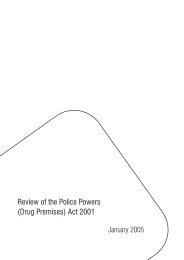Administration of Sentences - NSW Ombudsman - NSW Government
Administration of Sentences - NSW Ombudsman - NSW Government
Administration of Sentences - NSW Ombudsman - NSW Government
You also want an ePaper? Increase the reach of your titles
YUMPU automatically turns print PDFs into web optimized ePapers that Google loves.
search. Further, we suggest that it would be appropriate for more detailed reports to be made in instances where<br />
force has been used against a person, or a person has been detained or arrested.<br />
As well as enabling the department to develop a better understanding <strong>of</strong> the effectiveness <strong>of</strong> the stop, detention and<br />
search powers, better record keeping will also enable the department to:<br />
• provide more detailed and reliable information to police and courts if an <strong>of</strong>fence is suspected <strong>of</strong> being<br />
committed<br />
• improve the way it investigates complaints about the use <strong>of</strong> powers by correctional <strong>of</strong>ficers<br />
• determine whether there are any factors that prevent <strong>of</strong>ficers from complying with relevant legislative and policy<br />
provisions, and<br />
• determine whether further training <strong>of</strong>, or guidance to, correctional <strong>of</strong>ficers is necessary.<br />
While we note that improving record keeping will have an impact on <strong>of</strong>ficers’ time, we do not feel that the additional<br />
reporting requirements are likely to be overly onerous or time consuming.<br />
The right <strong>of</strong> victims <strong>of</strong> serious <strong>of</strong>fences to make oral submissions at<br />
parole hearings<br />
Prior to February 2003, victims <strong>of</strong> serious <strong>of</strong>fences could make a submission to the Parole Board about the possible<br />
release <strong>of</strong> an <strong>of</strong>fender on parole, in writing. Alternatively, and only with the approval <strong>of</strong> the Parole Board, victims could<br />
make submissions orally at the parole hearing. With the commencement <strong>of</strong> the Crimes (<strong>Administration</strong> <strong>of</strong> <strong>Sentences</strong>)<br />
Amendment Act 2002 victims <strong>of</strong> serious <strong>of</strong>fences were given the right to make an oral submission about the possible<br />
release <strong>of</strong> an <strong>of</strong>fender on parole, without requiring the prior approval <strong>of</strong> the Parole Board.<br />
Significant findings<br />
People entitled to make a submission<br />
The Crimes (<strong>Administration</strong> <strong>of</strong> <strong>Sentences</strong>) Act specifies who can claim to be a victim (or a family member <strong>of</strong> a victim)<br />
for the purposes <strong>of</strong> becoming registered on the Department <strong>of</strong> Corrective Services Victims Register. Inclusion on<br />
this register is a prerequisite for being provided with certain information about an <strong>of</strong>fender, and making a victim<br />
submission when the <strong>of</strong>fender is eligible to be released on parole.<br />
The definition <strong>of</strong> victim in this legislation is considered by some stakeholders to be problematic because it:<br />
• precludes some people who believe they are legitimate victims <strong>of</strong> an <strong>of</strong>fender from making a victim submission<br />
• provides no guidance about who may claim to be a family representative <strong>of</strong> a victim<br />
• does not enable more than one family member to register as a victim<br />
• is different to the definition <strong>of</strong> victims, and family members <strong>of</strong> victims, in other legislation in <strong>NSW</strong> concerning<br />
victims <strong>of</strong> crime and their rights.<br />
We were advised that in practice the Victims Register and Parole Board use discretion to determine who is eligible to<br />
be listed on the register, whether to allow more than one family member to register, and whether additional interested<br />
parties may make victim submissions.<br />
To overcome stakeholders’ concerns, and ensure the Parole Board does not act contrary to the legislative provisions<br />
in allowing particular people to make a submission, we recommend that the definition <strong>of</strong> victim should be amended.<br />
We note that any new definition should be specific enough so that victims and <strong>of</strong>fenders can be reasonably clear<br />
about who would be eligible to be registered as a victim, but flexible enough to cater for victims, families or affected<br />
people in unusual circumstances.<br />
Victims who choose to make a submission<br />
The Department <strong>of</strong> Corrective Services does not keep records about the characteristics <strong>of</strong> people who choose to<br />
register on the Victims Register. Nor does the Parole Board keep records about who makes a victim submission.<br />
Members <strong>of</strong> the Parole Board advised us it is their perception that:<br />
• the most common <strong>of</strong>fences for which people make a victim submission are murder, and sex <strong>of</strong>fences,<br />
particularly sex <strong>of</strong>fences against children<br />
<strong>NSW</strong> <strong>Ombudsman</strong><br />
Review <strong>of</strong> the Crimes (<strong>Administration</strong> <strong>of</strong> <strong>Sentences</strong>) Amendment Act 2002 and Summary Offences Amendment (Places <strong>of</strong> Detention) Act 2002 iii

















